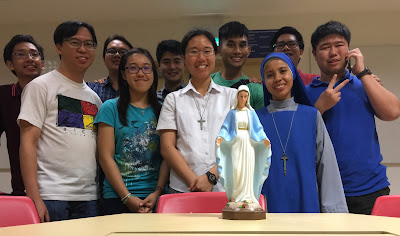Category Archives: Allocutio
Duc in Altum – Put out into the deep!
Duc in Altum is St John Paul II’s message at the turn of the second millennium. He planned ahead for the very long term, another millennium into the future. He understands that there are challenges in the Church and we need to put out into the deep, to herald a new era of new evangelization. Pope Francis echoes this call in asking us to go out to the peripheries to preach the Gospel and be witnesses of God to them.
To where God is calling us to put out into the deep (Duc in Altum)? Where God wants us to go where we don’t normally want to go? Who is God calling me to contact, especially those whom we normally would not contact? Be courageous and obedient to the Lord to “Duc in Altum” and harvest plenty of people for our recruitment drive this year.
– Simon, after seeing the great many of fish, fell down at his knees and asked Jesus to depart from him since he is a sinner.
– Jesus first shared the Word of God to Simon before asking him to Duc in Altum.
Tenderness as the path to solidarity
In his surprise TED Talk, shown on April 25, 2017, Pope Francis shared his ideas about how we can make the world better. In his talk, Pope Francis urges us to embrace solidarity. One path that can lead the world to solidarity is by starting a “revolution of tenderness.”
Here are some quotes from his talk:
You can also watch his whole talk here:
In High Enterprise for God
(A copy of “The Official Handbook of The Legion of Mary” can be found in the following link)
The Power of The Praesidium
Allocutio 05 May 17- Legion Handbook page 84-85 chapter 14 “The Praesidium”
A copy of “The Official Handbook of The Legion of Mary” can be found in the following link
A copy of “Theology of the Apostolate” by Cardinal Suenens can be found in the following link
The Way of Childhood- In Sinu Matris
Allocutio 28 Apr 17- Theology of the Apostolate p. 32-33 ch 4 pt 1
A copy of “Theology of the Apostolate” by Cardinal Suenens can be found in the following link
Allocutio on Allocutio
 |
| Spiritual Reading from Handbook Page 114 |
A Reflection on Pope Francis’ Amoris Laetitia
“As this Exhortation has often noted, no family drops down from heaven perfectly formed; families need constantly to grow and mature in the ability to love. This is a never-ending vocation born of the full communion of the Trinity, the profound unity between Christ and his Church, the loving community which is the Holy Family of Nazareth, and the pure fraternity existing among the saints of heaven. Our contemplation of the fulfilment which we have yet to attain also allows us to see in proper perspective the historical journey which we make as families, and in this way to stop demanding of our interpersonal relationships a perfection, a purity of intentions and a consistency which we will only encounter in the Kingdom to come. It also keeps us from judging harshly those who live in situations of frailty. All of us are called to keep striving towards something greater than ourselves and our families, and every family must feel this constant impulse. Let us make this journey as families, let us keep walking together. What we have been promised is greater than we can imagine. May we never lose heart because of our limitations, or ever stop seeking that fullness of love and communion which God holds out before us.” (Pope Francis’ Amoris Laetitia, page 255)
The following video provides quotes from the 256-page document that was based on the Synods on the Family in 2014 and 2015. Please press pause if you want to read each quote completely.
The document ends with a touching prayer, which also reminds us of the value of family.
The Premise of a Promise
Allocutio
12 February 2016
Spiritual Reading: Handbook, Chapter 13, Page 81, Item 7
 |
| Visitors from the Philippines join our meeting. 22 March 2016 |


